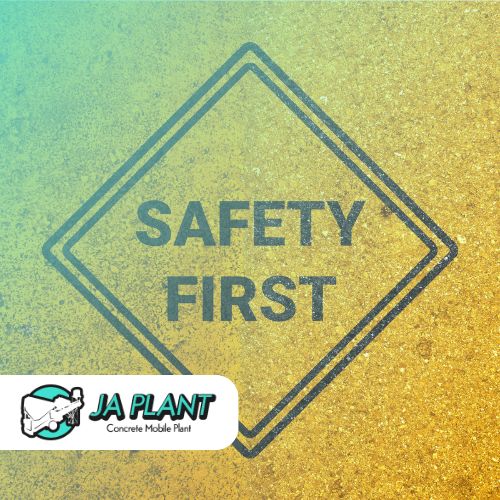Safety Tips for Using Concrete Batching Plants
19th Sep, 2023

Batching plants are heavy-duty construction equipment used to prepare batches of concrete. Like any other construction equipment, a batching plant has its own safety hazards. South Africa has strict regulations regarding construction work and worker safety. So, it’s important that all on-site workers and contractors are well-versed with the required safety protocols.
This article will cover everything you need to know about batching plants and the necessary safety tips for using them.
What are batching plants used for?
A mobile batching plant is an industrial piece of equipment used to prepare the concrete mix. The prepared concrete is then delivered to construction sites for building projects.
These plants are a cost-effective and efficient alternative to manually mixing concrete because you quickly get high volumes of concrete without needing much labour.
Who predominantly works with concrete batching plants?
Batching plant operators are the primary professionals responsible for operating and maintaining a batching plant. Their duties include overlooking the loading of the mix design process for each load and ensuring the concrete batches meet the required specifications and quality standards.
Their responsibilities also include to communicate effectively with other on-site personnel like project managers, delivery drivers, and supervisors.
Safety tips for using batching plants
Nearly 1.22 million South Africans are a part of the country’s construction industry. Since construction work is inherently hazardous, it’s crucial you know some safety tips to avoid the involved risks in using a batching plant for your project.
-
Go through training with all staff responsible for working with the batching plant
If you plan on setting up a batching plant for your construction project, your number one priority should be the health and safety of the workers. Even after taking the necessary safety measures, you can only do so much to prevent on-site injuries.
So it’s important that each worker receives the necessary health and safety training to protect themselves.
-
Implement emergency procedures and ensure everyone is informed on what those procedures are
Devise and inform all workers what the course of action will be in an emergency situation. The best strategy to prepare effective emergency protocols is to prepare for the worst. Even the scenarios which you believe are less likely to occur.
-
Ensure that the power is cut off first when a blockage occurs
If a machine gets blocked, you should have an automatic system that detects the blockage and cuts off the power. This prevents the machine from malfunctioning and injuring anyone in its proximity.
Placing emergency stop buttons around the batching plant is also necessary to give operators more control in an emergency situation.
-
The batching plant placement should not harm the environment or people in the area
Always hire professionals to set up your batching plant. They know the optimal placement for each piece of equipment to ensure the safety of the workers and surrounding machinery. Cordon off all none entry surrounding areas especially close to movable parts of the plant. Safety parameters must be adhered to at all times.
-
Staff working on and around the batching plant should wear the applicable PPE
To ensure a safe working environment, workers at a batching plant should be provided with suitable Personal Protective Equipment (PPE). This includes hard hats, gloves, dust masks, hearing protection, steel-toed boots, high-visibility vests, and safety glasses.
-
Avoid eating, drinking, and smoking while working
Don’t eat or drink anything near the batching plant. The food and drinks can become contaminated or damage machinery if you drop or spill them. Smoking near the batching plant is also dangerous because cigarettes can cause accidental fires.
-
All persons are to be prohibited from going into the batching area except trained personnel
A batching plant should only be operated by trained personnel. Untrained workers don’t know how the plant works and what could go wrong. Hence, they wouldn’t know the right emergency protocols in case of a mishap. Sending them in can be a danger to their lives and the plant equipment.
-
Ensure the necessary checks are performed before starting the batching plant
A batching plant operator should always perform the necessary checks before starting the batching plant to make sure everything is in the right working condition. This verifies that the plant was shut down correctly the day before and will not malfunction when turned on.
-
Ensure the necessary checks are performed after shutting down the batching plant
Performing necessary checks after shutting down the batching plant ensures no mishap happens after the workers leave. These frequent checks also mean that any problem with the plant is detected early and repaired.
This will save you from major damage and expensive repair costs.
-
Ensure cleaning procedures are adhered to after every use of the batching plant
It’s important that you clean the batching plant according to the manufacturer’s recommended procedure after every use. This prevents any blockage in the machinery and increases the life of your equipment. It also prevents cross-contamination between different batches of concrete.
-
Ensure regular maintenance and repairs are done to prevent breakdowns and possible hazards.
Regular maintenance checks ensure the plant is in the best working condition. They prevent major equipment damage and on-site injuries. It’s better to be safe than sorry. These checks are also regulatory requirements, meaning your plant can be shut down if not maintained.
How JA Plant can assist you with concrete batching plants
Contact us at JA Plant today to help you supply a high-quality batching plant on your construction site. We’re one of the leading manufacturers of concrete mobile batching plants in South Africa. We provide spare parts and fully automated systems to help you operate the batching plant efficiently and safely.
On request, for distant destinations, we construct the batching plant in split units that can be transported in containers. These can then be easily shipped and assembled at the destination site.